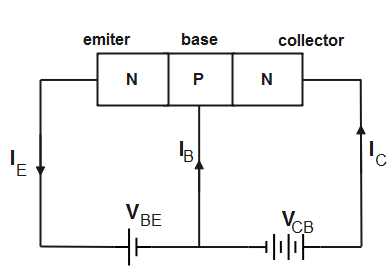
Are transistors semiconductors?
Answer
534k+ views
Hint: Semiconductors are devices which have conductivity less than metals but more than insulators. Their conductivity increases with increase in temperature. There are two types of semiconductors; p-type and n-type. Transistors are used as switches for electric signals and electric power and are also used as amplifiers. Transistors are made by combining three parts.
Complete answer:
Semiconductors are those elements which have electrical conductivity more than the insulators but less than conductors. There are two types of semiconductors; p-type and n-type semiconductors.
In p-type semiconductors, movement of holes conducts electricity while in n-type semiconductors movement of electrons conduct electricity.
Transistors are made by combining terminals; collector, base, emitter.
These terminals are combined together in a transistor to amplify electronic signals, act as a switch for electrical signals or electronic power.
The three terminals of the transistor are semiconductor and hence a transistor is also a semiconductor.
The different types of transistors are P-N-P transistor, where a n-type semiconductor is placed between two p-type semiconductor
N-P-N transistor -where a p-type semiconductor is placed between two n-type semiconductors.
Therefore, transistors are also semiconductor devices because they are made by combining three semiconductors.


Note: Transistors are the building blocks of all electronic devices. Out of the collector, base and emitter; the collector is the largest part and the base is the smallest part. P-type semiconductors are made by doping intrinsic semiconductors with elements which have shortage of electrons while the n-type semiconductors are made by doping intrinsic semiconductors with elements which have extra electrons.
Complete answer:
Semiconductors are those elements which have electrical conductivity more than the insulators but less than conductors. There are two types of semiconductors; p-type and n-type semiconductors.
In p-type semiconductors, movement of holes conducts electricity while in n-type semiconductors movement of electrons conduct electricity.
Transistors are made by combining terminals; collector, base, emitter.
These terminals are combined together in a transistor to amplify electronic signals, act as a switch for electrical signals or electronic power.
The three terminals of the transistor are semiconductor and hence a transistor is also a semiconductor.
The different types of transistors are P-N-P transistor, where a n-type semiconductor is placed between two p-type semiconductor
N-P-N transistor -where a p-type semiconductor is placed between two n-type semiconductors.
Therefore, transistors are also semiconductor devices because they are made by combining three semiconductors.


Note: Transistors are the building blocks of all electronic devices. Out of the collector, base and emitter; the collector is the largest part and the base is the smallest part. P-type semiconductors are made by doping intrinsic semiconductors with elements which have shortage of electrons while the n-type semiconductors are made by doping intrinsic semiconductors with elements which have extra electrons.
Recently Updated Pages
Master Class 12 Economics: Engaging Questions & Answers for Success

Master Class 12 Physics: Engaging Questions & Answers for Success

Master Class 12 English: Engaging Questions & Answers for Success

Master Class 12 Social Science: Engaging Questions & Answers for Success

Master Class 12 Maths: Engaging Questions & Answers for Success

Master Class 12 Business Studies: Engaging Questions & Answers for Success

Trending doubts
Which are the Top 10 Largest Countries of the World?

What are the major means of transport Explain each class 12 social science CBSE

Draw a labelled sketch of the human eye class 12 physics CBSE

Why cannot DNA pass through cell membranes class 12 biology CBSE

Differentiate between insitu conservation and exsitu class 12 biology CBSE

Draw a neat and well labeled diagram of TS of ovary class 12 biology CBSE




